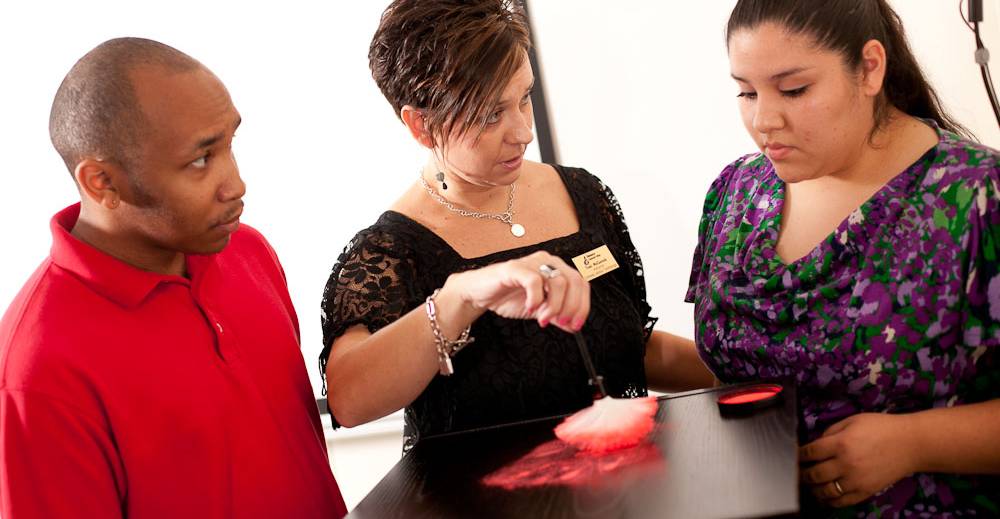Health and Public Services
CRIMINAL JUSTICE
ASSOCIATE IN APPLIED SCIENCE
Forensic Science is a concentration under the curriculum of Criminal Justice Technology, which focuses on the application of the physical, biomedical, and social sciences to the analysis and evaluation of physical evidence, human testimony and criminal suspects. Study will focus on local, state, and federal law enforcement, evidence processing and procedures.
Essential Functions and Technical Standards Requirements
Purpose Statement:
All students in the Criminal Justice Technology (CJC) program are expected to meet
certain essential functions/technical standards which are essential for successful
completion of all phases of the program, and which reflect industry requirements and
standards. The following technical standards represent the essential nonacademic requirements
of the Criminal Justice Technology Program that a student must master to successfully
participate in the program and become employable. To verify the students’ ability
to perform these essential functions, students may be required to demonstrate the
technical standards/essential functions.
Meeting these technical standards does not guarantee employment in this field upon graduation. Ability to meet the program’s technical standards does not guarantee a student’s eligibility for any licensure, certification exam, or successful completion of the program.
Technical Standards |
Definition of Standards |
Examples |
| Critical Thinking/Problem Solving Skills | Ability sufficient for classroom, lab and work in industry situations. | Read and apply information from lectures, textbooks, and audio/visual materials. Follow
and practice rules and regulations of the North Carolina Board of Cosmetic Art Examiners.
Evaluate client/guest reactions/responses and make sound conclusions. Develop and
implement a service and maintenance plan. Analyze product Receive, interpret and correctly complete assignments such as reading, research, writing, and presenting. Assess simulated crime scenes and interpret evidence to determine cause of incident. |
| Interpersonal Skills | Abilities sufficient to interact with individuals and groups from a variety of social, emotional, cultural and intellectual backgrounds. | Participate in team projects with other students. Provide assistance to fellow students and instructors when requested. Maintain a cooperative spirit while working in a simulated crime scene. Respect and care for fellow students and guests whose appearance, condition, beliefs, and values may conflict with your own. Demonstrate sufficient emotional health to perform under stress, exercise good judgment and promptly complete all academic and work based learning responsibilities. |
| Communication Skills | Abilities sufficient for interaction with others in verbal and written form. |
Speak and write clearly and distinctly. Give verbal directions and follow verbal directions from other members of the class or instructors. Demonstrate listening skills. |
| Coping Skill | Ability to maintain a state of harmony. | Solves personal and interpersonal problems. Minimizes stress and conflict. Balances internal needs and external demands. |
| Motor/Mobility Skills | Physical abilities sufficient to move in one’s environment with ease and without restriction. Gross and fine motor abilities sufficient to process simulated crime scenes. | Some classes require motor skills to collect fingerprints and other evidence by using small tools and light equipment. |
| Auditory Skills | Auditory abilities sufficient to work effectively and safely. | Hear the instructor's voice in a classroom, online and lab environment. Hear emergency instructions. |
| Visual Skills | Visual ability sufficient for observation and assessment necessary in classroom, lab and other locations on the campus collecting evidence from a simulated crime scene. | Discern and collect evidence in a simulated crime scene. Read safety labels and warnings such as specific Safety Data Sheets (SDS). |
| Tactile Skills | Tactile ability sufficient for processing simulated crime scenes. | Use small tools and light equipment to gather simulated evidence in a simulated crime scene |
| Environmental | Must be able to function safely under varying environmental factors. | Stoop, bend, kneel to collect evidence in a simulated crime scene |
| Emotional/Behavioral | Stability adequate to function in classroom, online, and simulated crime scene lab and interact effectively with instructors and classmates. | Adapt rapidly to changing environmental and/or stress. Calmly receive feedback. Demonstrate flexibility, honesty, and cooperative behaviors in the classroom and lab. |
Alamance Community College is committed to providing equal educational opportunities for students with documented disabilities. Students who require accessibility services or reasonable accommodations must identify themselves as having a disability and provide current diagnostic documentation to the Accessibility Services Office located in the Main Building, Room 233. All information is confidential. Please contact the Accessibility Services Coordinator for more information at 336-506-4130 or email at accessibilityservices@alamancecc.edu and notify your course instructor of your special needs, as appropriate. Students should initiate this process as soon as possible (prior to the start of classes and/or field experience).
|
Criminal Justice Technology Program Estimated Costs and Fees |
|
|
Student Activity Fee |
$35.00 |
|
Curriculum Instructional Technology Fee |
$27.00 |
|
College Access, Parking & Security (CAPS) Fee |
$18.00 |
|
Student Accident Insurance |
$1.00 |
|
Lab Fees |
$630.00 |
|
Books |
$50.00 |
|
|
|
|
*Does not include cost of tuition. Tuition will vary from semester to semester depending on the number of credit hours taken. |
|
|
|
|
|
Have you applied for Financial aid? Please visit Financial Aid for instructions |
|
Contact InformationTraci Holt |
Why Wait?YOU BELONG HERE |
